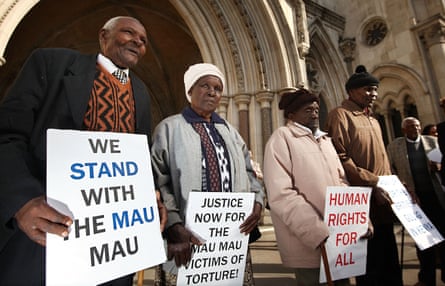Thousands of Kenyans who say they were driven from their homes and abused under British colonial rule and subsequently faced hardship and poverty have called on the UN to launch an investigation into their treatment.
British and Kenyan lawyers submitted a complaint to the UN special rapporteur on the promotion of justice, Fabián Salvioli, on behalf of more than 115,000 people originally from Kericho county, who claim they were forcibly removed from their ancestral lands by the British army.
The victims say they were moved by the army, under instructions from the colonial administration, from their fertile lands to arid and disease-prone “native reserves” with no compensation.
The Kipsigis and Talai peoples who once lived in what are now known as Kericho and Bomet counties also claim they were raped and tortured when they were “brutally driven from their homes” and resettled.
Starting with the crown land ordinance of 1902, 36,000 hectares (90,000 acres) of land in Kericho is alleged to have been taken from the Kipsigis and Talai, divided into farms and given to white European settlers.
Lawyers say the UK pursued an intentional policy of violent displacement and resettlement after realising the land in Kericho county was well suited to cultivating tea on plantations.
The victims are urging the British government to open an investigation into the alleged crimes, arguing their treatment between 1895 and 1963 amounted to a gross violation of human rights.
In November, the Foreign Office received a similar complaint but refused to open an investigation.
Paul Chepkwony, the Kericho county governor, said: “The victims are still there and there are offsprings to these victims and we are in a situation where sufferings are still being felt for atrocities that were committed decades ago, and we are saying that we should bring this to a closure.
“Those that were removed from Kericho were sent to a place called Gwassi. A very hostile environment which is not habitable for human beings. As a matter of fact, the Kenya government have declared it a national park.
“It is a place that is only suitable for wild animals because of the high presence of lions, reptiles, crocodiles and insects that cause tropical diseases – these people were confined to the native reserves to pave way for European highlands.”
There have been numerous attempts to pursue colonial-era injustices through the British courts, several involving the period of the Mau Mau uprising in Kenya.
In 2013, the UK government agreed to pay out £20m in compensation to more than 5,000 elderly Kenyans who were tortured and abused during the uprising in the 1950s. The decision followed a legal victory by the London law firm Leigh Day on behalf of three survivors who won the right to claim damages for the abuse they suffered.

But a more recent legal claim by Manchester-based Tandem Law raising the cases of a further 40,000 Kenyans who claimed they were variously tortured, mistreated and raped during the suppression of the rebellion failed. The high court refused to allow the larger Mau Mau case to proceed because it said the events had taken place too long ago for there to be a fair trial.
The trial raised the question of how far back in history legal claims for compensation can be pursued. Personal injury claims are supposed to be brought within three years unless it would be inequitable to uphold such a strict time limit.
There have been attempts by Caribbean states to claim reparations from European countries for the transatlantic slave trade dating back to the 17th century. They have so far been resisted by the UK government.
Rodney Dixon QC from Temple Garden Chambers in London, who is acting for the group, said: “We are not litigating this case in the courts for now. It’s much more appropriate for it to be taken forward through engaging directly with the UK government and seeking to mediate, arbitrate and settle the matter, because it involves both land issues which have not been raised in previous cases and also the human rights violations that were occasioned by the forcible removals as well as their continuing effects.
“We have submitted the complaint on behalf of our clients to the Foreign Office and asked to meet to address the matter and settle it. They have to date refused to meet with us.
“We have thus escalated the case to the United Nations to request the UN to assist in seeking to investigate this matter and to obtain a constructive settlement in the best interests of all parties.”
The Foreign Office said: “The UK supports the important work of UN special rapporteurs. We have not received any correspondence from the UN special rapporteur but will respond accordingly if and when any correspondence is received.”










